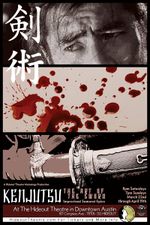Difference between revisions of "Kenjutsu"
From Austin Improv Community Wiki
Monkeyangst (talk | contribs) |
Monkeyangst (talk | contribs) |
||
| Line 14: | Line 14: | ||
The show depicted epic tales of corruption, power, and betrayal set in feudal Japan, inspired by Japanese samurai films such as ''[[wikipedia:Seven Samurai|Seven Samurai]]'', ''[[wikipedia:Harakiri (1962 film)|Harakiri]]'', and ''[[wikipedia:13 Assassins|13 Assassins]]''. Prior to the title being finalized, the show was referred to familiarly as ''Kurosawa'' in honor of director [[wikipedia:Akira Kurosawa|Akira Kurosawa]]. | The show depicted epic tales of corruption, power, and betrayal set in feudal Japan, inspired by Japanese samurai films such as ''[[wikipedia:Seven Samurai|Seven Samurai]]'', ''[[wikipedia:Harakiri (1962 film)|Harakiri]]'', and ''[[wikipedia:13 Assassins|13 Assassins]]''. Prior to the title being finalized, the show was referred to familiarly as ''Kurosawa'' in honor of director [[wikipedia:Akira Kurosawa|Akira Kurosawa]]. | ||
The cast trained with and used, on stage, actual ''bokken'' (wooden samurai swords). Combat was | The cast trained with and used, on stage, actual ''bokken'' (wooden samurai swords). Combat was performed in slow motion. | ||
[[Category:Shows]] | [[Category:Shows]] | ||
[[Category:The Hideout Theatre]] | [[Category:The Hideout Theatre]] | ||
Revision as of 16:16, 26 June 2014
| Kenjutsu | |
|---|---|
| Theater | The Hideout Theatre |
| Directed by | |
| Cast | |
| Crew |
|
| Run | Mar/Apr 2014 |
Kenjutsu (full title: Kenjutsu: The Art of the Sword) was a mainstage show at The Hideout Theatre that was inspired by Japanese samurai films.
Summary
The show depicted epic tales of corruption, power, and betrayal set in feudal Japan, inspired by Japanese samurai films such as Seven Samurai, Harakiri, and 13 Assassins. Prior to the title being finalized, the show was referred to familiarly as Kurosawa in honor of director Akira Kurosawa.
The cast trained with and used, on stage, actual bokken (wooden samurai swords). Combat was performed in slow motion.
